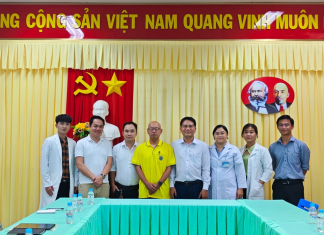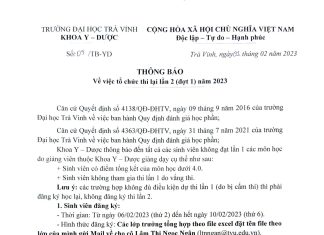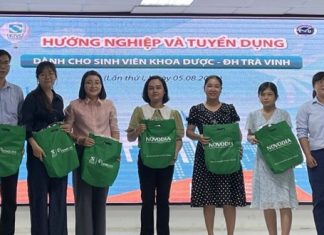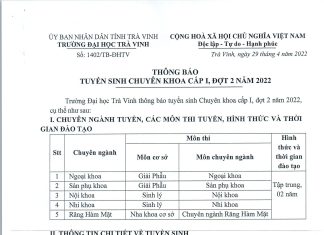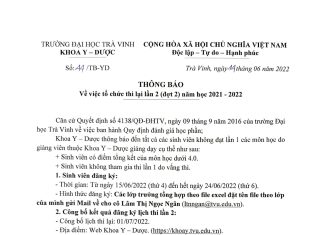The Department consists of 6 Divisions, as the followings:
- Division of Fundamental Nursing
- Division of Medical Nursing
- Division of Obstetric and Gynecological Nursing
- Division of Pediatric Nursing
- Division of Community Nursing
- Division of Surgical Nursing
- Introduction about Nursing Program

Ms. Huynh Thi Hong Thu, MSN, BSN, RN
The Head of Nursing Department
The Director of Nursing’s Baccalaureate Program
Bachelor of Science in Nursing program is designed in 2011 and the enrollment of the first course begins in 2012. In June 2020, the program has 5 graduation batches with a total of 251 graduates and currently there are 3 students pursuing post-graduate program.
Mission
Nursing Department serving Nursing Program committed to training undergraduate students with solid medical knowledge and leadership skills, research and professional practice.
Vision
Nursing Department, The School of Medicine and Pharmacy continues to develop the Bachelor of Nursing program with a student-centered characteristic, integrating and updating advanced science and technology, with humanity and community application
Educational Philosophy of Nursing Program
“Developing a Competency-Based Education with Student-Centered Teaching,
Applying Evidence for Patient-Centered Care”
We, The Nursing Department of School of Medicine and Pharmacy, present herein our shared values and perspectives so that these may guide us in our teaching, research, and curricular decision making.
Nursing is a humanistic science considered as the liberal arts and sciences as well. This foundation when integrated with evidence-based nursing and patient-centered approach provides the basis of professional practice. Nursing is a dynamic interactive process in which professional caring is central and in a variety of contexts with individuals, families and communities, across the age continuum and at all stages of the health/illness continuum through to the process of dying.
Competency-based education demonstrate acquisition of the identified essential knowledge, skills, and attitudes expected for the designated educational process before leaving the learning environment.
The baccalaureate program prepares nurses to practice effectively as generalists within the health care system, functioning in roles as providers, designers, managers, and coordinators of care. The program fosters the development of professional values and value-based behaviors. We strive for excellence in educational programs that position our graduates for leadership roles in health care settings of the future, able to adapt to and direct a rapidly changing health care environment. We believe in lifelong learning and modeling leadership within the profession. They demonstrate this through their practice, research and participation in scholarly activities.
The learning environment is flexible and student-centered allowing for a free exchange of ideas. Teaching and learning are an interactive process whereby both teacher and learner assume responsibility for the acquisition of knowledge. Multiple settings including communities and hospitals in according the community hospital and medical school linkage allow the student to carry out the nursing practice in a variety of planned learning experiences
Expected Learning Outcomes (ELOs)
Diploma title: Bachelor of Science in Nursing
|
Expected Learning Outcomes |
|
|
Bachelor of Science in Nursing |
|
|
After completing the program, graduates are able to: |
|
|
General knowledge |
|
|
ELO 1 |
Apply the knowledge of natural and social sciences to health care |
|
Professional Knowledge |
|
|
ELO 2 |
Analyze health problems and make care decisions that meet the needs of individual, family and community |
|
ELO 3 |
Evaluate the quality of health care and management services for patients and people |
|
ELO 4 |
Design a holistic care model in the direction of patient-centered care |
|
Transferable Skills |
|
|
ELO 5 |
Apply analytical and critical thinking to solve career-related problems in social contexts |
|
ELO 6 |
Work independently and lead the care team to achieve the purpose of health care |
|
ELO 7 |
Develop cross-cultural communication skills through the multimedia tool use to deliver healthcare and increase the international integration |
|
Professional skills |
|
|
ELO 8 |
Deliver patient care according to the nursing process and relied upon the medical evidence to ensure safety |
|
ELO 9 |
Develop health counseling skills to serve individual, family and community |
|
ELO10 |
Utilize information technology and modern equipment in care practice and scientific research |
|
Attitude |
|
|
ELO 11 |
Adhere to the law, professional working style, medical ethic maintenance and a sense of social responsibility |
|
ELO 12 |
Demonstrate entrepreneurial motivation and lifelong learning |
Declare our program
|
PROGRAM SPECIFICATION |
|||||
|
Admissions/Management Information |
|||||
|
Title of the program |
|||||
|
Bachelor of Science in Nursing |
|||||
|
Vietnamese Nursing Framework level |
|||||
|
Bachelor (Level 6) |
|||||
|
The following information is provided to students admitted to the training program: |
|
||||
|
Awarding institution |
Teaching place |
||||
|
Tra Vinh University |
Tra Vinh University |
||||
|
School |
|||||
|
School of Medicine and Pharmacy |
|||||
|
Name of degree awarded |
|||||
|
Bachelor Science of Nursing |
|||||
|
Programme code |
|||||
|
7720201 |
|||||
|
Admissions criteria |
|||||
|
– Method 1: Considering the results of the National High School Examination, which is the plus point of 03 subjects according to the combination of examination subject reaching the minimum quality assurance threshold for university entrance as prescribed by the Ministry of Education and Training (Ground score, usually the total score of 3 subjects in the exam is >=15) – Method 2: Considering the average score of the subjects in the 12th grade year of the selection subject combination. The minimum score threshold is 6.0 or higher for undergraduate majors. – Method 3: Direct recruitment of students who won prizes in national and international competitions for excellent students – Examination subject combinations: +B00: Maths – Chemistry – Biology +D08: Maths – Biology – English |
|||||
|
Length and status of the program(s) and mode(s) of study |
|||||
|
Program |
Length (years) |
Status (full-time/part-time) |
Start dates/months (if applicable – for program |
Mode |
|
|
Bachelor Science of Nursing |
4,0 years |
Full-time |
September |
Face-to-face, campus-based |
|
|
Language(s) of study |
|||||
|
Vietnamese |
|||||
|
Language(s) of assessment |
|||||
|
Vietnamese |
|||||
|
2. Program accredited by profession, law or regulation |
|||||
|
According to the provisions of the Education Law |
|||||
|
3. Programme leader |
|||||
|
Ms.Huynh Thi Hong Thu , Mr. Nguyen Van Trung |
|||||
|
4. Job profiles |
|||||
|
Graduates can take up the following positions: – Teaching staff, research staff of universities, colleges, professional secondary schools, research institutions ; – Public and private health facilities; – Self-organizing health care at home ; – Medical institutions (schools, factories,…); – Elderly care facilities in Vietnam and the world |
|||||
|
5. Purpose and learning outcomes of the programmes |
|||||
|
5 a. Educational philosophy and teaching/learning strategy |
|||||
|
Educational philosophy of Tra Vinh University and the program The University has an educational philosophy: ““Based on the practical, ethical and responsible training competencies, learners will develop into better individuals to serve a better society “ The educational philosophy of the program is “Developing a Competency-Based Education with Student-Centered Teaching, Applying Evidence for Patient-Centered Care” |
|||||
|
5b. Programme objectives |
|
|
PO 1 |
Apply evidence-based practice to deliver health care for individual, family and community and become a qualified human resource for the health sector of Vietnam |
|
PO 2 |
Develop nursing profession according to ethics and creativity that are suitable for the working environment |
|
PO 3 |
Enhance the capacity of lifelong self-study and research for personal development and nursing profession |
|
PO4 |
Develop international capacities to connect the Vietnamese nursing industry with the rest of the world |
|
5c. Expected learning outcomes of the programme |
|
|
ELO 1 |
Apply the knowledge of natural and social sciences to health care |
|
ELO 2 |
Analyze health problems and make care decisions that meet the needs of individual, family and community |
|
ELO 3 |
Evaluate the quality of health care and management services for patients and people |
|
ELO 4 |
Design a holistic care model in the direction of patient-centered care |
|
ELO 5 |
Apply analytical and critical thinking to solve career-related problems in social contexts |
|
ELO 6 |
Work independently and lead the care team to achieve the purpose of health care |
|
ELO 7 |
Develop cross-cultural communication skills through the multimedia tool use to deliver healthcare and increase the international integration |
|
ELO 8 |
Deliver patient care according to the nursing process and relied upon the medical evidence to ensure safety |
|
ELO 9 |
Develop health counseling skills to serve individual, family and community |
|
ELO 10 |
Utilize information technology and modern equipment in care practice and scientific research |
|
ELO 11 |
Adhere to the law, professional working style, medical ethic maintenance and a sense of social responsibility |
|
ELO 12 |
Demonstrate entrepreneurial motivation and lifelong learning |
|
5.d. Other program information |
|
i) Learning about |
|
The program aims to equip students with the skills to work in the nursing industry to meet the requirements of the domestic and foreign labor market. |
|
ii) Organization to participate in training |
|
The program provides learning opportunities for all students regardless of ethnicity, gender, or disability status. |
|
6. Reference points and program regulations |
|
iii) Internationalization |
|
The program aims to equip students with the skills to work in the nursing industry to meet the requirements of the domestic and foreign labor market, compatible with regional and international standards. The program has students from the ASEAN region participating in the study. Students have the opportunity to participate in international academic exchange activities with parnerships in countries over the world. Besides, the University has international exchange activities to create a multicultural communication environment. |
|
iv) The potential students |
|
The program provides learning opportunities for all learners regardless of ethnicity, gender, or disability |
|
7. Program structure and requirements including levels, courses, credits, etc. |
|
7.a. Program Structure |
|
No |
Code |
Course name |
Credits |
|||
|
Total |
Theory |
Practice |
||||
|
SEMESTER I |
|
|||||
|
1 |
|
Physical Education 1* |
1* |
|
1* |
|
|
2 |
|
Defense and security education |
165 periods |
|||
|
3 |
180000 |
Basic principles of Marxism – Leninism |
5 |
5 |
0 |
|
|
4 |
410291 |
Professional English |
3 |
2 |
1 |
|
|
5 |
220072 |
Applied Infomatics |
3 |
1 |
2 |
|
|
6 |
650062 |
Chemistry |
2 |
2 |
0 |
|
|
7 |
650002 |
Biology and Genetics |
2 |
2 |
0 |
|
|
8 |
450015 |
General law |
2 |
1 |
1 |
|
|
|
|
Total |
17 |
13 |
4 |
|
|
SEMESTER II |
|
|||||
|
9 |
|
Physical Education 2* |
1* |
|
1* |
|
|
10 |
180001 |
Ho Chi Minh Thought |
2 |
2 |
0 |
|
|
11 |
650058 |
Professional English |
4 |
2 |
2 |
|
|
12 |
650058 |
Probability – Medical Statistics |
2 |
1 |
1 |
|
|
13 |
650519 |
Physics and Biophysics |
2 |
2 |
0 |
|
|
14 |
650558 |
Biochemistry |
2 |
1 |
1 |
|
|
15 |
650073 |
Anatomy – Embryology |
3 |
2 |
1 |
|
|
16 |
650071 |
Physiologic |
2 |
1 |
1 |
|
|
17 |
650493 |
Microbiology and Parasitology & Lab |
3 |
2 |
1 |
|
|
18 |
650562 |
Infection Control and Health Care |
2 |
1 |
1 |
|
|
|
|
Total |
22 |
14 |
8 |
|
|
SEMESTER III |
|
|||||
|
19 |
|
Physical Education 3* |
1* |
0 |
1* |
|
|
20 |
180004 |
The Revolutionary Way of the Vietnamese Communist Party |
3 |
3 |
0 |
|
|
21 |
410293 |
Professional English |
3 |
2 |
1 |
|
|
22 |
650547 |
Pathophysiology – Immunology |
2 |
2 |
0 |
|
|
23 |
650181 |
Pharmacological |
2 |
2 |
0 |
|
|
24 |
650560 |
Medical Psychology – Professional Ethics |
2 |
2 |
0 |
|
|
25 |
650648 |
Communication and Health Education |
2 |
1 |
1 |
|
|
26 |
650306 |
Fundamental nursing skill 1 & Lab |
4 |
2 |
2 |
|
|
27 |
650307 |
Fundamental nursing skill 2 & Lab |
4 |
2 |
2 |
|
|
28 |
650123 |
Nutrition and Nursing Care |
2 |
1 |
1 |
|
|
|
|
Total |
24 |
17 |
7 |
|
|
SEMESTER IV |
|
|||||
|
29 |
650349 |
Professional English |
3 |
2 |
1 |
|
|
30 |
650637 |
Medical Nursing Care 1: Adult |
2 |
2 |
0 |
|
|
31 |
650638 |
Nursing Practice 1: Adult with medical conditions |
2 |
0 |
2 |
|
|
32 |
650639 |
Surgical Nursing Care 1: Adult |
2 |
2 |
0 |
|
|
33 |
650640 |
Nursing Practice 1: Adult with surgical conditions |
2 |
0 |
2 |
|
|
34 |
650641 |
Pediatric Nursing Care |
2 |
2 |
0 |
|
|
35 |
650642 |
Nursing Practice: Pediatrics |
2 |
0 |
2 |
|
|
36 |
650643 |
Obstetrics and Gynecology Nursing |
2 |
2 |
0 |
|
|
37 |
650644 |
Nursing Practice: Obstetrics and Gynecology |
2 |
0 |
2 |
|
|
|
|
Total |
19 |
10 |
9 |
|
|
SEMESTER V |
|
|||||
|
38 |
650458 |
Health System and Management |
2 |
2 |
0 |
|
|
39 |
650072 |
Environmental health – Improving human health and behavior |
2 |
1 |
1 |
|
|
40 |
650085 |
Nursing management and Leadership |
2 |
1 |
1 |
|
|
41 |
650584 |
Communicable diseases and Nursing Care |
1 |
1 |
0 |
|
|
42 |
650585 |
Nursing Practice: Communicable disease Patients |
2 |
0 |
2 |
|
|
43 |
650645 |
Community health car |
1 |
1 |
0 |
|
|
44 |
650646 |
Community Health Practice |
1 |
0 |
1 |
|
|
45 |
650590 |
Psychological Disorders and Mental Health Care |
1 |
1 |
0 |
|
|
46 |
650591 |
Nursing Practice: Psychiatrics and Mental Health |
1 |
0 |
1 |
|
|
47 |
650588 |
Geriatric Nursing Care |
1 |
1 |
0 |
|
|
48 |
650589 |
Nursing Practice: Geriatrics |
2 |
0 |
2 |
|
|
|
|
Total |
16 |
8 |
8 |
|
|
SEMESTER VI |
|
|||||
|
|
|
Compulsory course |
5 |
3 |
2 |
|
|
49 |
650495 |
Epidemiology – Scientific research |
3 |
2 |
1 |
|
|
50 |
650496 |
Nursing Research and Application |
2 |
1 |
1 |
|
|
|
|
Elective courses: choose 2 out of 4 topics |
10 |
4 |
6 |
|
|
51 |
650649 |
Topic: Nursing Care in Dermatological and Tuberculosis Patient |
2 |
2 |
0 |
|
|
52 |
650650 |
Nursing Care practice in Dermatological and Tuberculosis Patient |
3 |
0 |
3 |
|
|
53 |
650651 |
Topic: Nursing care in otolaryngology and ondonto-stomatology |
2 |
2 |
0 |
|
|
54 |
650652 |
Nursing care in otolaryngology and ondonto-stomatology: practicum |
3 |
0 |
3 |
|
|
55 |
650592 |
Topic: Non-communicable disease and Palliative Care |
2 |
2 |
0 |
|
|
56 |
650593 |
Non-communicable disease and Palliative Care: practicum |
3 |
0 |
3 |
|
|
57 |
650594 |
Topic: Children’s Critical Care |
2 |
2 |
0 |
|
|
58 |
650595 |
Children’s Critical Care: practicum |
3 |
0 |
3 |
|
|
|
|
Total |
15 |
7 |
8 |
|
|
SEMESTER VII |
|
|||||
|
59 |
650349 |
Professional English for Nursing |
2 |
1 |
1 |
|
|
60 |
650580 |
Medical Nursing Care 2: Adult |
1 |
1 |
0 |
|
|
61 |
650581 |
Nursing Practice 2: Adult with medical conditions |
2 |
0 |
2 |
|
|
62 |
650582 |
Surgical Nursing Care 2: Adult |
1 |
1 |
0 |
|
|
63 |
650583 |
Nursing Practice 2: Adult with surgical conditions |
2 |
0 |
2 |
|
|
64 |
650653 |
Traditional Medicine and Physical therapy |
2 |
2 |
0 |
|
|
65 |
650654 |
Nursing Practice: Traditional Medicine and physical therapy |
2 |
0 |
2 |
|
|
66 |
650586 |
Critical Care and Emergency |
1 |
1 |
0 |
|
|
67 |
650587 |
Nursing Practice in Critical Care and Emergency |
2 |
0 |
2 |
|
|
|
|
Total |
15 |
6 |
9 |
|
|
SEMESTER VIII |
|
|||||
|
68 |
650596 |
Final internship |
3 |
0 |
3 |
|
|
69 |
000004 |
Graduation thesis |
7 |
0 |
7 |
|
|
|
|
Total |
10 |
|
10 |
|
|
7.b. Elective course list |
|
650649 |
Topic: Nursing Care in Dermatological and Tuberculosis Patient |
2 |
2 |
0 |
|
650650 |
Nursing Care practice in Dermatological and Tuberculosis Patient |
3 |
0 |
3 |
|
650651 |
Topic: Nursing care in otolaryngology and ondonto stomatology |
2 |
2 |
0 |
|
650652 |
Nursing care in otolaryngology and ondonto stomatology: practicum |
3 |
0 |
3 |
|
650592 |
Topic: Non-communicable disease and Palliative Care |
2 |
2 |
0 |
|
650593 |
Non-communicable disease and Palliative Care: practicum |
3 |
0 |
3 |
|
650594 |
Topic: Children’s Critical Care |
2 |
2 |
0 |
|
650595 |
Children’s Critical Care: practicum |
3 |
0 |
3 |
|
7.c. Program evaluation design |
||
|
i) Contact the lecturer |
||
|
The Bachelor Science of Nursing program is designed with 138 credits, 75 theory, 56 practice. Theoretically, besides having lessons in classroom, students also self-study and self-research through channels such as e-learning, homework, group discussions, presentation and etc. Regarding practice, beside practicing at the labs, nursing lab, simulation room under the direct guidance from teachers, the program was designed clinical internship at hospitals from level III to level I inside and outside the province; practice of public health care at the district health center so that students have the opportunity to apply theory into clinical practice through learning. In addition, students also learn by project. |
||
|
ii) Students’ self-study and research |
||
|
Regarding E-learning online resources, students can take the initiative in their study time and study anytime, anywhere. There is an online learning exchange environment, with direct supervision and feedback from lecturers. In addition, students can actively search for documents, self-study and research at the University’s Learning Resource Center. Modules that including practice nursing skills, clinical practice at pre-clinical room, simulation room, nursing practice room, the hospital level III to level I in and outside the province , practicing Community health centers at district health centers with the supervision and teaching of experienced clinical instructors provide students with the opportunity to improve their professional competence, communication skills and experience in health care settings. |
||
|
iii) Final Evaluation |
||
|
Types of assessment: rubric, project, seminar, mid-term assessment (1st process test, short answer questions, report on results). End-of-term assessment (multiple-choice exam, essay test, oral exam, practice exam of nursing skills , OSPE, OSCE, mini-CEX, long case, seminar report, essay) |
||
|
8. Contribution of casual teaching staff and/or staff external to the University |
||
|
The Bachelor Science of Nursing of Tra Vinh University engages the participation of experts from hospitals and professional associations and health science training universities in Vietnam. Experts from many different units, such as Tra Vinh province (Tra Vinh General Hospital , Pediatrics Hospital, Hospital of Tuberculosis and Lung Disease, Traditional Medicine Hospital, Cang Long District Medical Center, General Hospital of Tieu Can area; outside Tra Vinh province (Ben Tre Psychiatric Hospital, Nguyen Dinh Chieu Hospital, Tien Giang Central General Hospital) and the Vietnam Nursing Teachers Association. Based on the needs of the training program, the School of Medicine – Pharmacy has effectively implemented the combined training model of School – Hospital; The lecturers involved in teaching theory and clinical practice in the Bachelor of Nursing program come from hospitals and universities, all of whom have clinical teaching experience and have practice certificates at medical facilities across the country more than 3 years. Annually, the School of Medicine and Pharmacy regularly opens classes to update medical knowledge continuously and organizes training courses on clinical teaching methods for clinical instructors. They actively teach and evaluate student learning outcomes based on regulations such as grades, rubrics, products,… |
||
|
9. Learning through experience |
||
|
9.a. The program requires students to learn through experience at medical facilities |
||
|
The program provides learning opportunities through clinical internships in medical facilities under the guidance of experienced clinical educators with good ethics and dedication to the profession. The course has 12 compulsory specialized subjects and 2 groups of elective subjects, clinical practice at general and specialized hospitals inside and outside the province, district health centers (practice of public health care) and professional practice. |
||
|
9.b. Supporting students in experiential learning |
||
|
Practical clinical learning through practice of comprehensive patient care, effective team collaboration in interdisciplinary to achieve goals set out in medical facilities is required. Students must complete these modules in order to study further modules |
||
|
9c. Brief details on the nature of work-based learning |
||
|
1. Pre-clinical practice (basic nursing, communication – health education in nursing practice, infection control ) , simulation practice 2. Professional clinical practice 3. Final internship: Graduation internship |
||
|
9.d. Who will be responsible for sourcing and placement? |
||
|
The School is in charge of establishing relationships with medical facilities inside and outside the province, to establish and cooperate with medical facilities in the training process. The School has a study plan for students in medical facilities and sends it to students before entering the internship semester. Based on a network of more than 40 hospitals from level III to level I, Departments of Health and Universities and Colleges providing training in Health Sciences in and outside the province. In particular, students have the opportunity to choose and experience learning clinical internships and summer semester experiences through cooperation and student exchange programs studying in Japan, Taiwan and Philippines according to the needs of students. The team of full-time teaching faculty, community internships and clinical internships are considered based on the standards prescribed by the Training Industry, all have certificates, have clinical teaching methods, most of them on 3 years of experience and passion for the profession. The department selects the clinical unit at the medical facilities in accordance with the internship content and practice facility conditions as prescribed by the Ministry of Health. Every day, students must report activities at the medical facility to the clinical instructor; Every week, clinical instructors must report progress and activities at the medical facility to the department, the Department reports the learning progress to the School in weekly and monthly faculty meetings. At the end of the clinical internship module, the student submits a complete report on the subject content and presents the results to the panel. |
||
|
9.e. What is work-based learning time? |
||
|
Duration of learning through clinical practice in a medical facility is at least 3 months per module |
||
|
9.f. How will work-based learning be assessed? |
||
|
In addition to becoming an intern at clinical departments in medical institutions, students must also undertake practical topics given by professionals at the medical facility. The outcome of these modules is the involvement of the facility instructor, the instructor and the 3-member panel. The score is the average of over 5 points, according to the components: Score of internship in medical facility , score of work with instructor, product score and topic report |
||
|
10. Students participate in program development How are current and/or alumni involved in the development of this proposal/program? |
||
|
Students are allowed to contribute ideas for program improvement through surveys and regular and ad hoc meetings of the Department with students. Student feedback on the quality of the instructors’ teaching in each subject is collected through face-to-face or online assessments at the end of each course. Feedback on teaching methods is provided through an annual survey and exit survey. |
||
|
11. Change the program |
||
|
ii) Transfer to the program will be? (please select Y/N) |
Y- Yes |
|
|
ii) Moving out of the program will be? (please select Y/N) |
N- No |
|
|
12. Quality and standards |
||
|
The school has a framework in place to ensure that the standards of its programs are maintained and that the quality of the learning experience is enhanced. Quality assurance and enhancement processes include: – The academic supervisor of the program of training in the departments of the Council of Science and Education , including student representatives – The monitoring program of the external examiners, who ensure that standards at Tra Vinh University is equivalent to other programs in the industry – Managing monitoring and annual periodic assessment of programs and acquiring feedback from the faculty and students through the National Student Survey. |
||
|
13. Date on which this programme specification was written or revised |
||
|
May 19, 2021 |
||
|
14. Matrix showing how the programme learning outcomes are achieved through the courses |
||
Văn Trung – Tiến Thịnh


